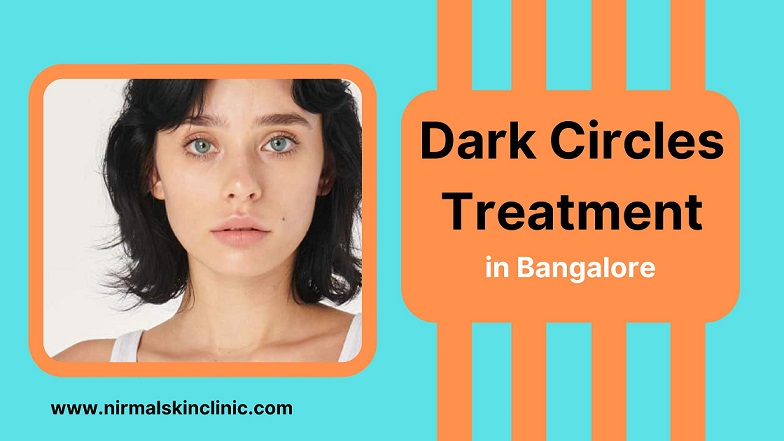
Dark circles under the eyes (medically termed periorbital hyperpigmentation) are relatively common and typically not hazardous. Depending on the skin tone, one may observe a deepening or shadow effect across the skin beneath the eyes in brown, blue, purple, or black. Various factors, including heredity, aging, and exhaustion, can cause dark circles. Those looking for Dark Circles Treatment in Bangalore might be curious to learn what a dermatologist has to offer beforehand. Let’s find the same in this blog. First, know what are the causes of dark circles.
What Causes Dark Circles?
-
Genetics: Dark circles beneath the eyes are often passed down through families. According to studies, having a family history of dark circles also increases the chances of developing them, and this may be the most significant risk factor.
-
Aging: With age, the skin thins and loses suppleness and volume. These skin changes in the sensitive under-eye area might highlight blood vessels, resulting in a darker look.
-
Allergies: Congestion in the sinus canals can cause blood vessel enlargement under the eyes, resulting in dark circles. Furthermore, scratching and itchy or unpleasant eyes might exacerbate the appearance of circles.
-
Sleep Deprivation: Research supports the idea that a lack of sleep can cause dark circles beneath the eyes in the morning. Skipping sleep can affect blood vessel dilatation, resulting in a darker appearance beneath the eyes.
-
Fluid Retention: Various factors, including smoking, a salty diet, NSAIDs, and medical problems affecting the thyroid, kidneys, liver, or heart, can cause fluid retention. Dark circles might appear as blood vessels dilate beneath the eyes.
-
Sun Exposure: For some people, exposure to the sun causes their bodies to create more melanin, the pigment that gives skin its color. Sun damage also damages the skin, making dark circles more visible.
While dark circles can affect anyone, they may be more common in persons with a family history of dark circles, older adults, and people with darker skin tones.
Medical Treatments For Dark Circles
If one is not receiving the results one wants from home treatments, it may be time to consult a dermatologist. They will be able to assist one in narrowing down the source of the dark circles—such as allergies, thinning skin, or a lack of sleep—and provide professional treatment choices to help minimize the coloring beneath the eyes.
-
Prescription Topical Products
Depending on the root cause of the dark circles, a topical treatment with more active ingredients may be prescribed. For dark circles caused by hyperpigmentation (excessive melanin production in the skin), a skin-lightening topical medication such as hydroquinone can assist. Other active substances that provide comparable outcomes are kojic acid, azelaic acid, and prescription retinoids.
Prescription topical drugs should be used exactly as prescribed, as some may cause side effects or pose hazards if used excessively or inappropriately.
-
Injectable Fillers
Injectable dermal fillers containing hyaluronic acid are known for their plumping and volumizing properties and can be utilized to smooth up the under-eye area. This can make any darkening caused by the orbicularis oculi muscle beneath the skin and visible blood vessels less conspicuous.
Bleeding, bruising, skin irritation, and other concerns may occur using fillers, which the dermatologist will explain with one before treatment. These are temporary side effects.
-
Laser Therapy
Laser therapy works by applying regulated heat to the skin discoloration area while stimulating new skin cell growth. This lightens the skin beneath the eyes, resurfacing it and reducing wrinkles, which can accentuate dark circles.
Redness, swelling, itching, and other moderate side effects may occur depending on the type of laser utilized.
-
Chemical Peels
Chemical peels can help lighten the pigmentation beneath the eyes. The products containing glycolic acid, alpha hydroxy acid, or lactic acid have been demonstrated to improve discoloration in the area. This method works by carefully removing skin layers with a chemical solution, resulting in overall smoothing and whitening.
Chemical peels are generally safe and effective. However, there may be some moderate discomfort on the days following the procedure. Some skin aftercare may be required to prevent issues such as hyperpigmentation or scarring.
-
Cosmetic Surgery
There are a few surgical methods for treating dark under-eye circles, depending on the underlying cause. A fat transplantation can add volume to an area with significant skin thinning, whereas a blepharoplasty (a surgical treatment to remove extra skin) can lift, tighten, and smooth the area, assisting in eliminating dark shadows.
Remember that any surgery has risks, so address any questions or concerns with a dermatologist beforehand.
Consult a Leading Skin Clinic in Bangalore for Dark Circles
It is important to remember that if no natural remedies work or the tips and products do not work, one should consult a dermatologist. One can consult Dr. K.C. Nischal and Dr. Urmila Nischal at Nirmal Skin & Hair Clinic. This leading Skin Clinic in Bangalore is home to FDA-approved technologies and utilizes advanced treatment options to provide effective outcomes.
Consult the Nirmal Skin & Hair Clinic specialist today to determine the best treatment option!



